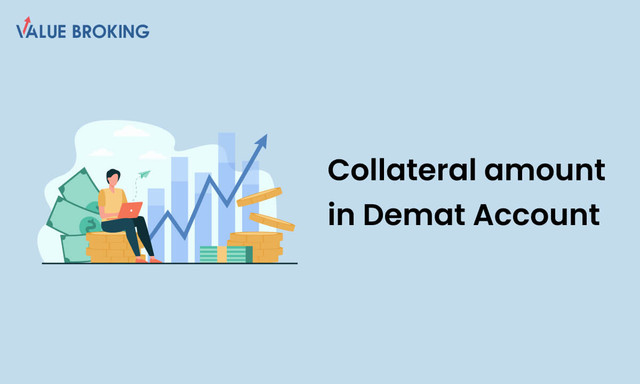Learn about collateral amount in Demat account

Before diving into this topic, first, understand the concept of a loan. Secured and unsecured loans are the two different types of loans. When you take an unsecured loan, like a credit card loan or personal loan, you don’t need to submit security to the bank, but when you take a secured loan, like a home loan or a car loan, you need to submit Security to the bank. Now the security that you submit to your bank also has a further classification, i.e., the prime security and the second is the collateral security.
Now let’s move on to the next step, i.e., the basic explanation of the Demat account:
Demat account is an essential part of investment and trading in the stock market. Every time you buy something from the market, it gets automatically stored in your Demat account. Likewise, every time you purchase something from the market, it gets automatically stored in your Demat account if you have correctly linked your trading and Demat accounts. First, you need to understand the concept of the collateral amount in a Demat account. However, you may wonder now what is the collateral margin?
Table of Contents
The Collateral Amount in a Demat Account
In the case of a Demat account, this kind of amount is nothing but a loan that allows you to trade securities. More clearly, you receive this account against the shares of your Demat account. Due to this amount, you can trade beyond your capital limit.
The Securities and Exchange Board of India (SEBI), the market regulator, allows using shares as collateral to increase your trading capacity. A collateral amount is a loan provided by a stockbroker to their clients for trading in stock and shares against shares held in your Demat account. This collateral amount is also known as collateral margin. You are using the securities in your Demat account as collateral to increase your trading capacity by increasing the number of funds in your trading account. In India, not all stockbrokers provide this service. It is an additional value-added service provided by a few brokers. One can use these margins to trade futures, sell options, and intraday equity.
When you pledge your idle stocks or shares as collateral, your stockbroker will provide you with a loan by increasing your trading limit instead of disbursing cash. In addition, your broker will charge a fixed percentage of interest for providing this service. Thus, a Demat account holder can trade without spending more money to trade securities.
If a Demat account holder wants to trade in shares but is short of funds, they can use this service offered by stockbrokers. If you use your idle stocks as collateral, the stocks will get temporarily blocked. You can’t further sell the securities in your Demat account until you repay the margin and the accrued interest.
After making the required payments, the securities kept as collateral will get released to the account holder. Then you can make any transactions to sell or transfer the shares. However, if you fail to repay the collateral, the broker can sell the collateral shares and recover the capital. Hence make sure to pay all your margins to your broker to get hold of your securities.
To use the margin trading facility, investors must have a margin account with the broker. As a result, the margin may vary with brokers.
Advantages of Collateral Margin
Collateral in the Demat account is helpful for both the Demat account holder and the broker. Trading in the stock market with a margin has many advantages.
A few of the advantages are:
- First, this margin can increase the purchasing power of an investor.
- Second, an investor can use their idle shares in their online Demat account for good purposes.
- Third, this margin can increase the rate of return on your invested capital.
- Plan your trades smartly so that you can repay the amount promptly.
What are the Risks Associated with Margin?
Remember that collateral-margins offering some benefits are high-risk for both the investor and the broker. To qualify for this collateral-margin trading facility, an investor must hold or maintain the required minimum cash-to-collateral ratio. It can be pretty challenging to accomplish for some investors.
If you didn’t keep the minimum balance, you would get forced to sell some securities to maintain this ratio. Since the pledged shares may not cover the total percentage of the margin loan, the transactions can be risky. Sometimes investors may end up losing more than what they invested.
Conclusion
Demat accounts facilitate easy and hassle-free transactions of securities. An investor can use their shares in their Demat account as collateral to avail loan. Using your shares as collateral is a better choice than using cash. However, one needs to be careful as it may involve some risks.
Even when the margin provides facilities like increasing your purchasing power, it may also increase the rate of interest on your investment capital. Therefore, it is still essential to repay your margin to your broker. And if you’re looking for a collateral loan, first consult your stockbroker to see whether he provides this facility or not. As already mentioned above, not all stockbrokers give this facility. Hence, look for a stockbroker who does provide this facility.
Frequently Asked Questions (FAQs)
Yes, you can use the pledge of your shares to avail loan from the broker.
Yes, you can release the hold on the same day itself.
Yes, the account holder must satisfy all the eligibility requirements specified by the broker to get the margin. The most important thing is maintaining a specific percentage of the margin value in cash in your trading account.
Collateral margin means extra funds that you can use to trade and invest in the stock market, but you need to pledge assets in your Demat account.